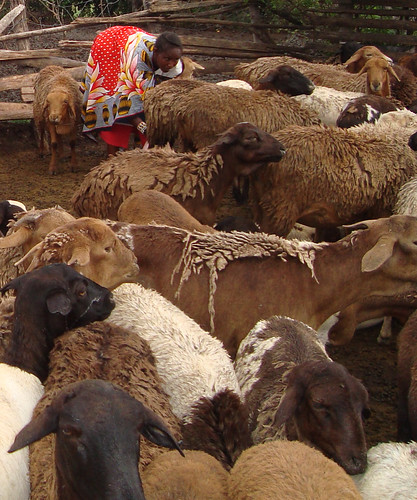The ‘hairless’ (non-wool-producing), native and worm-resistant red Maasai sheep of East Africa (photo credit: ILRI).
An article this week in InterPress Service tells of Samburu pastoral herders working to bring back their native Red Maasai sheep because it does better than other, exotic, breeds, in the increasingly variable climate of northern Kenya.
‘. . . Herders in Kenya’s dryland areas say that Dorpers [sheep] are now proving less resilient under more frequent drought linked to climate change.
‘The conditions are bringing the qualities of . . . Red Maasai [sheep] to the fore. This indigenous Kenyan breed, typically reddish-brown in colour, has not enjoyed much popularity internationally both due to its small stature and because it grows hair on its body rather than wool.
‘”I have seen my neighbours lose their Dorpers to drought, and this is an experience I wouldn’t want to go through,” says Lenamira [Samburu]. . . .
‘But the Red Maasai breed is under pressure, says Dr Jacob Wanyama, coordinator of the African LIFE Network, which works to defend the rights and livelihoods of pastoralists. “It is not easy to find pure indigenous breeds especially of cattle, sheep and goats. . . .
‘Though no proper survey has yet been done to confirm this, Wanyama’s observations tally with the herder Lenguris: with increasingly frequent drought, farmers with pure exotic breeds are usually the first to lose their animals, followed by those with crossbreeds.
‘”This reveals how important it is to protect the genetic biodiversity,” says Wanyama.
‘In an effort to safeguard the remaining stock of pure indigenous sheep, Lenamira and others have with support from the LIFE Network formed a conservation group composed of 60 pastoralists from the district, who have specialised in rearing Red Maasai. Each of them has between 200 and 500 animals.
‘The conservation group may have found some allies in an unexpected quarter. Animal genetic experts at the International Livestock Research Institute in Nairobi have discovered that the Red Maasai breed has genetic traits that make it resistant to intestinal worm parasites, a major problem for sheep herders not only in Kenya, but on commercial farms in Australia and New Zealand.
‘Dr Okeyo Mwai, one of the lead researchers at ILRI, says that the individual genes have not yet been isolated; and scientists are still a long way from being able to transfer specific traits to other sheep breeds.
‘”At the moment, the most logical option is to have the Red Maasai bred [conventionally] for improved growth, fertility and feed efficiency,” says Dr Okeyo Mwai, one of the lead researchers at ILRI, “crossbreed with other hardy breeds to ensure that such important genes are not lost, but are sustainably conserved in commercial flocks, as we hold a waiting brief for genomic technologies to be become affordable and more practical.”
‘The government of Kenya has quickly recognised that, save for the modest efforts of groups like Lenamira’s, genetic treasures like the Red Maasai are under threat and indigenous breeds need urgent protection.
‘This realisation has led the government of Kenya to launch the National Advisory Board on Animal Genetic Resources to coordinate indigenous livestock farmers, research institutions, universities and all other interested parties in an effort to preserve the remaining genetic resources.
‘”The Board has already been launched. At the moment, we are in the process of drafting a bill on the same, which will be presented to the cabinet during the month of February 2011 to be turned into law,” said Cleopas Okore, the Deputy Director of the Kenya’s Ministry of Livestock and Development, and the Coordinator of the Advisory Board on Genetic Resources.
‘Isolation of worm-resistance genes from the Red Maasai sheep may see this most neglected sheep breed catapult into a very important resource, providing farmers with the most needed biological worm control mechanism.’
Read the whole article at IPS: Kenyan pastoralists look back to secure their future, 15 February 2011.
Filed under: Animal Breeding, Biotech, CRP11, Drylands, East Africa, ILRI, Indigenous Breeds, Kenya, PA, Pastoralism, Sheep, Small Ruminants Tagged: IPS, Okeyo Mwai, Red Masai sheep

